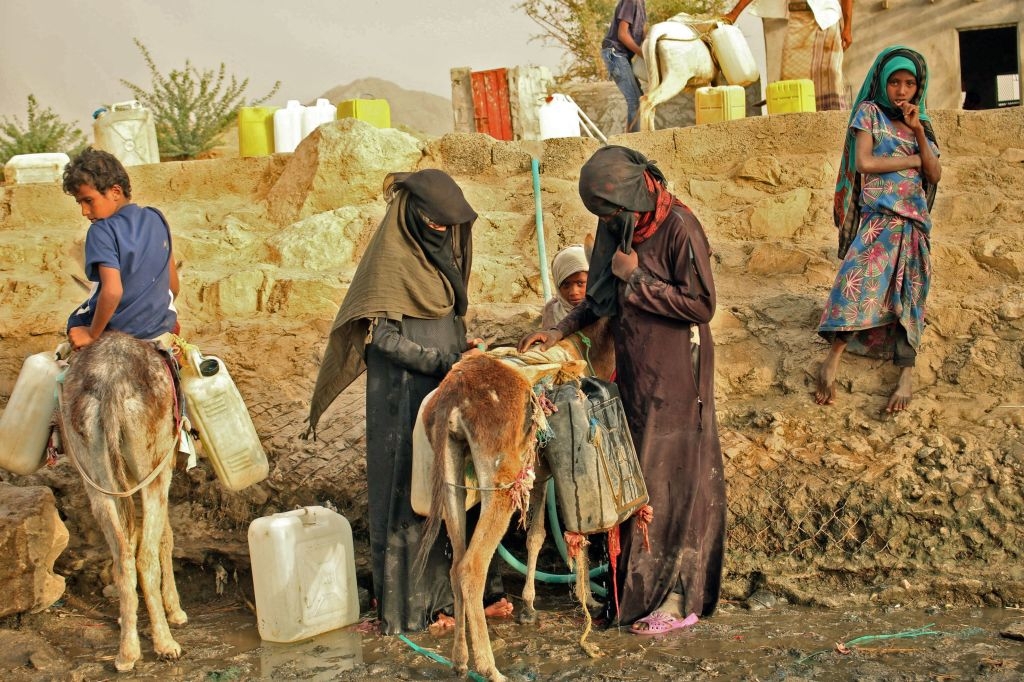In this mailing:
- Con Coughlin: Iran, Not Saudi Arabia, Is to Blame for Yemen's Humanitarian Crisis
- Denis MacEoin: Qassem Soleimani: Iran's Latest 'King of Martyrs'?
- Is Today's Cannabis the Same as at Woodstock or Is It Now More Dangerous?
by Con Coughlin • February 13, 2020 at 5:00 am
Now, with the humanitarian crisis reaching a critical juncture with an estimated 80% of Yemen's 24 million population in need of assistance, aid organisations are finally waking up to the central role the Iranian-backed Houthis have played in creating the disaster.
As humanitarian officials prepare to meet in Brussels this week -- Thursday -- to discuss the Yemeni aid crisis, the main topic of discussion will be what has been described as the unprecedented and unacceptable obstruction tactics being employed by the Houthis that are preventing vital aid supplies from reaching the country's starving population.
In their latest bid to seize control of the aid distribution, the Houthis have recently imposed a 2 percent levy on all the international aid agencies operating in the country, prompting one aid worker to claim that the Houthis could be using the aid money to finance the war.
Whatever the outcome, no one will be in any doubt that it is the Iranian-backed Houthis, and not the Saudi-led coalition, who are primarily responsible for creating Yemen's disastrous humanitarian crisis.

As Yemen's humanitarian crisis reaches a critical juncture, with an estimated 80% of the country's 24 million people in need of assistance, aid organisations are finally waking up to the central role the Iranian-backed Houthis have played in creating the disaster. Pictured: Displaced persons fill water containers at a makeshift camp in a village in Hajjah province, Yemen, on May 9, 2019. (Photo by Essa Ahmed/AFP via Getty Images)
In the five years since Yemen was plunged into its bitter civil war, it has invariably been the Saudi-led coalition, which enjoys the support of the US, Britain and France, that has been blamed for causing what is widely regarded as the world's greatest humanitarian disaster.
Throughout the conflict the main focus of coverage in most of the Western media has been on the role played by the Saudi military in intensifying the conflict, with Riyadh taking the lion's share of the blame for the estimated 100,000 Yemenis that have died.
The Saudis, it is true, have not always covered themselves in glory in the way they have conducted the military campaign, with frequent reports of Saudi warplanes attacking civilian targets.
by Denis MacEoin • February 13, 2020 at 4:30 am
Esmail Ghaani, Soleimani's successor as head of the Quds Force, has promised: "to continue martyr Soleimani's path with the same force and the only compensation for us would be us would be to remove America from the region."
So much terrorism has come from Tehran.... as distant as Latin America.
One might also ask why has the United Nations never held Iran accountable for these violations?
One might also ask if the time has finally come for the UN's largest donors -- read the US -- to rethink their generosity? Why not, as Ambassador John R. Bolton long ago recommended: "that we should pay for what we want and insist that we get for what we pay for."

Esmail Ghaani, Qassem Soleimani's successor as head of Iran's Quds Force, has promised: "to continue martyr Soleimani's path with the same force and the only compensation for us would be us would be to remove America from the region." (Image source: Tasnim News [CC by 4.0])
When news broke on the morning of January 3 that Qassem Soleimani, an Iranian general who for many years had headed the Quds Force, the powerful extraterritorial operations arm of the regime's Islamic Revolutionary Guard Corps (IRGC), had been assassinated -- along with Abu Mahdi al-Muhandis, head of the Iraqi Ketaib Hezbollah militia -- in a US drone strike at Baghdad airport, pundits across the globe burst into print, some to condemn, others to praise his killing.
Neither side seems to want an all-out war. On October 7, 2019, US President Donald J. Trump tweeted:
"... it is time for us to get out of these ridiculous Endless Wars, many of them tribal, and bring our soldiers home. WE WILL FIGHT WHERE IT IS TO OUR BENEFIT, AND ONLY FIGHT TO WIN."
|
|
|
No comments:
Post a Comment